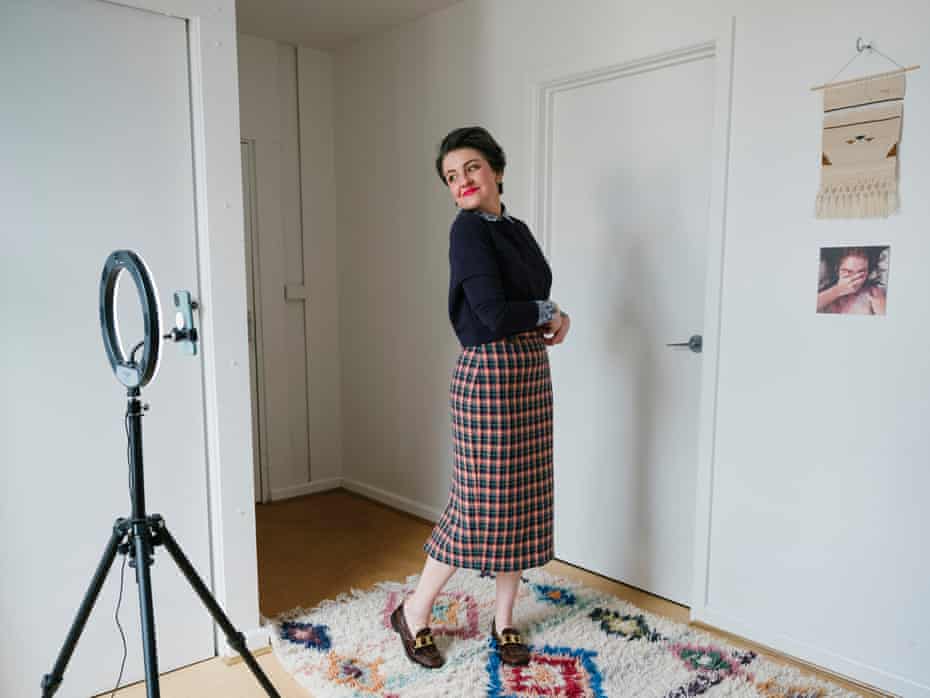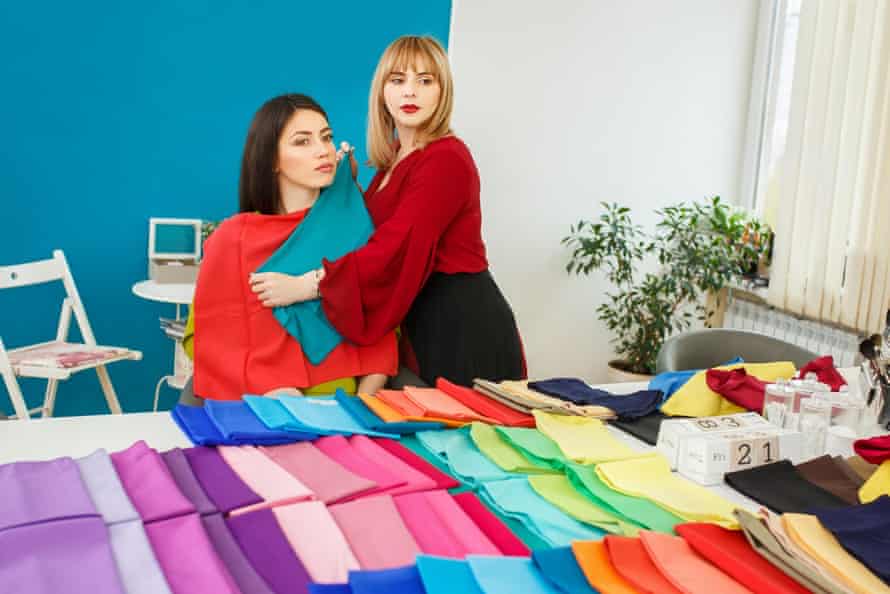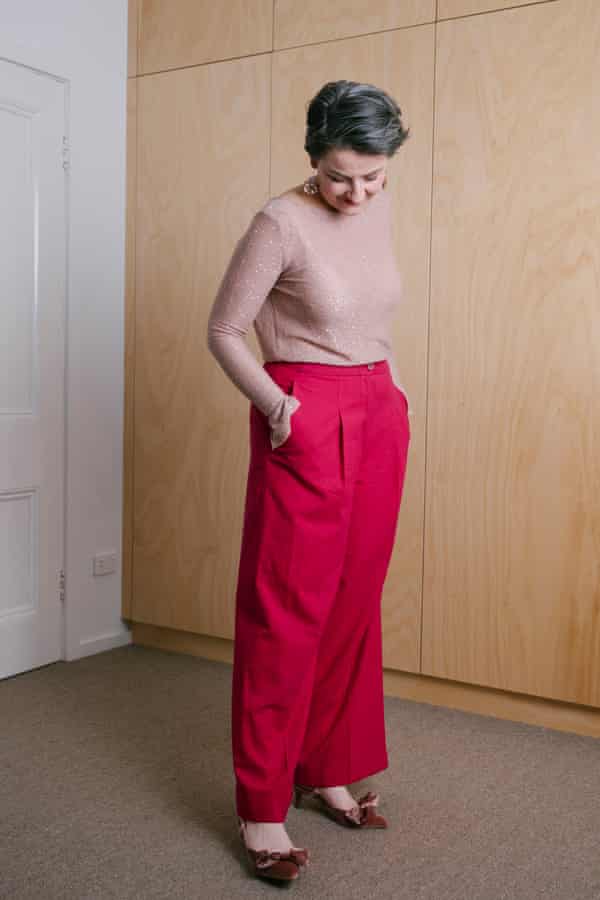Amelia Crook did not set out to have an existential crisis.
The 43-year-old was simply looking for some tips on how to update her style. She used to spend her days reading Vogue, maintaining meticulous lookbooks on Pinterest, and even took a mid-career sabbatical to intern for a milliner in New York whose clients included Debbie Harry. But now, she felt stuck in the “mum uniform”: the same Breton stripe T-shirt everyone else in her small town in regional Victoria wore at the school pick-up queue.
“I wanted to not do that,” she says.
But it’s never quite that simple. Because developing a personal style is, well, personal. To understand how you want to look, you first need to understand who you are.
The baggage was more than Crook signed up for when she created a TikTok account in May, requesting help to find her misplaced style.
“I wanted the Queer Eye guys to come and be like: here you go, there go you, done!” She laughs. “But I think even in that show … you can’t do that without making someone cry.”
Saved for Later – sign up for our weekly rundown of must-reads, pop culture and tips for the weekend
In Crook’s first video, posted on 6 May, she wears a tracksuit (of course) and issues a plea. “I need your help. I’m Amelia, I’m 42, and I’ve misplaced my personal style.”
“The day I made that video I was sick at home, bored,” she says. She’d been having a recurring thought, “the idea of not knowing how to dress in the pandemic”.
“It kept coming up, like when you drive a certain car and then you see cars like yours on the road all the time.” It felt like a “moment”. “Something’s happening, so let’s see what happens if I put it out there. I had no plans of where this would go.”
The post was a hit. Comments rolled in underneath: some women stuck in the same rut; some offering advice and others vowing to tear apart their own wardrobes alongside her.
It was, from the start, a more frugal and cautious approach to style than is common on TikTok fashion accounts. Instead of a pile of fast fashion, her first “clothing haul” featured pieces she already owned. Her weekly lookbook had an extravagant jumpsuit one day, and ugg boots the next.
An early video showing her style rules (no heels, no dry cleaning, nothing too tight, kid-proof, and she’s not dying her grey hair) was viewed 50,000 times. More suggestions followed in the comments: for ethical brands to buy, that she should never wear overalls (lest she look like a Play School host), that she should keep the grey hair but cut it short.
Her project has now reached 50,000 followers – some teenagers, but many grown women. The comments veer from a politely supportive stranger in a change room, to the aggressive enthusiasm of women you meet in the toilet queue at 1am.
There are still those wrestling with their own wardrobes, and others who have developed efficient systems for managing their fashion requirements and are keen to pass this knowledge on.
She got the haircut – a very French, slicked-back style copied from actress Rebecca Dayan – and kept it grey. She bought a secondhand denim jacket at commenters’ urging and now wears it several times a week. And she bought a pair of vintage Prada brogues for her birthday – a style first suggested to her on TikTok.
But not all outfits that TikTok loves have made it into regular rotation. There is a canary yellow fluffy jumper which her followers adore. “I have never worn it out of the house because I’m allergic to it,” she says.

As the community she’s built suggests, Crook is not alone in her existential wardrobe crisis. A year of being largely confined to our homes has changed our bodies, our careers, and fractured dress codes. We don’t know what to wear any more.
The only comfort is that the experience is collective. It’s a micro issue, this question of how to dress in public again, blown up on a macro scale.
TikTok is not the only resource for solving these problems. Guides to dressing for your shape, complexion or age were once common, and now enjoy a second life online. As part of Crook’s style reinvention, her followers hounded her to take classic fashion quizzes from the 1980s.
She learned where she falls on the seasonal colour chart (she’s a cool, bright winter) and determined her “Kibbe” body type. That system, outlined by the stylist David Kibbe in his 1987 book Metamorphosis, has gained a cult following. A secondhand copy of the out-of-print title can fetch hundreds of dollars on eBay, but the quiz can be found on dozens of blogs.
Both systems have a daggy, dated feel, and can exclude people of colour. But if you can correctly answer the questions – do your veins appear green under sunlight or blue? Do your arms appear long to others? – they provide some useful information.
For instance, Crook now knows why she was showered with compliments while wearing a bright blue dress last Christmas, and why a friend declared her ‘fresh’ late one evening, though she felt the opposite – it was down to her lilac jumper. Both are winter colours. The fashion designer Suzanne Caygill, who popularised the idea of seasonal colour analysis, was clearly on to something.

Charts and types had always “sounded like a multi-level marketing scheme”, Crook says. “Doing my colours made me feel like I was going back in time. But it has changed the way I look at clothes.”
Now when she walks into an op-shop, she can pick clothes fast. “These are the colours that my eyes are looking for, and these are the cuts that will suit my body.”
Still posting regularly, she has begun to be recognised offline, too. At a holiday on the Victorian coast, a girl walking past said: “That’s her! I think that’s her! The woman who lost her personal style!”
It was perhaps, she says, not the most flattering epithet she could have chosen for herself. “I’ve invited criticism of what I’m wearing, and that feels a bit weird to translate to real life.”
It has also made her friends pay more attention to her fashion choices. Some took her self-critique as an insult – she was often wearing the same clothes as them.
“They were a bit flummoxed by why I started this journey and also a bit defensive,” she says. “It’s a pretty privileged position to be sitting around thinking ‘what’s my personal style?’.”
Her way around this discomfort has been to focus on sustainability. Most of her clothes are purchased second hand, those that do not work out are sold on. It’s a way to balance her desire to be stylish with her anxiety about global heating.
The fashion industry produces around 10% of global carbon dioxide emissions every year, according to the Intergovernmental Panel on Climate Change, and uses 1.5tn litres of water annually.
TikTok abounds with videos of people doing try-on hauls, often from fast fashion brands like Shein or Zara. Watching those videos makes Crook concerned for her daughters. “I could go out and buy a completely new wardrobe from Zara but that is gonna screw the planet for them.”
Consuming less was part of the reason Crook wanted to determine her personal style in the first place: you cannot buy pieces that last without knowing what you’ll keep wearing.

It’s also a way to reckon with the privilege of being in a position to examine her dress sense at all, a thing that many, due to money, access or body size, are not able to do.
“It’s taking the time to sort of reflect on your relationship with fashion, with money, with society’s expectations of how you interact with the world, with your privilege,” she says. “All of that needs to be unpacked and reassessed in order to go forward.”
Through months of searching, Crook arrived at a style that felt familiar. She started wearing jeans again, after years spent thinking they didn’t suit her body. “It turns out I just needed to buy the next size up.”
How she dresses now echoes the first clothes she picked out for herself as a 15-year-old, before external expectations got in the way.
“It is instinct at that age, about who you are and what feels right, without having had the experience of fitting in or interacting with society that much really.”
She is dressing, for the first time in years, just to please herself.
“And I look at my daughters … one is so clear that she is a rock chick. She wants to dress like Joan Jett. And the other one is all princesses and pretty things – she thinks she’s very fashion. These are little girls who have had the same upbringing and yet they are very clear about their fashion choices.
“I don’t want to get that knocked out of them.”
https://www.theguardian.com/fashion/2021/sep/18/the-woman-who-lost-her-personal-style-and-turned-to-tiktok-to-find-it
 fashion rec fashion wanted
fashion rec fashion wanted



